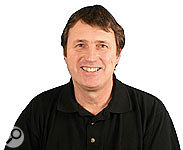What is the most important skill you need to develop in order to make good recordings? This is a question I'm asked quite often, and answering it isn't as straightforward as you might think, because recording combines a lot of different processes and skills — not the least being the ability to put performers at their ease. But leaving interpersonal skills aside, I think it's probably fair to say that the one skill you can't do without is the ability to listen to music in an analytical way that takes into account both musicality and sound quality.
 For example, if you're recording an acoustic guitar, you need to know what it should sound like in order to choose the right microphone and put it in the right place, and your ears also need to be well enough attuned to recognise whether the recording environment is improving the sound or compromising it. Can you tell the timbre of a good instrument from an indifferent one? Is the room colouring the sound? Can you hear if the strings need changing? Similarly, you need to be aware of the slightest tuning problem, ideally before the player realises anything is wrong. I've been in a situation where I've had to tell a classical harpsichord player that one of his notes was noticeably out of tune, and once I'd pointed this out he heard it right away and fixed it. Up until then, he'd been so focused on playing the part that he hadn't noticed the tuning issue.
For example, if you're recording an acoustic guitar, you need to know what it should sound like in order to choose the right microphone and put it in the right place, and your ears also need to be well enough attuned to recognise whether the recording environment is improving the sound or compromising it. Can you tell the timbre of a good instrument from an indifferent one? Is the room colouring the sound? Can you hear if the strings need changing? Similarly, you need to be aware of the slightest tuning problem, ideally before the player realises anything is wrong. I've been in a situation where I've had to tell a classical harpsichord player that one of his notes was noticeably out of tune, and once I'd pointed this out he heard it right away and fixed it. Up until then, he'd been so focused on playing the part that he hadn't noticed the tuning issue.
Vocal recording is perhaps the one area that really stretches your listening skills, as there's a lot more to a great vocal performance than just hitting the right notes. You need to be able to appreciate the timing and phrasing of the performance, and then to balance what is ideal with what the singer is capable of delivering. It is your job to get the best performance you can from the vocalist, but part of that is recognising when they're actually performing at their best. Linked with this responsibility is your ability to detect when something is going wrong and take the necessary steps to put it right. For example, the singer's posture may be improved by increasing the height of the mic and/or the lyric sheet, so that they are not constricting their throat by singing downwards. And, of course, they need a comfortable headphone mix with just the right amount of reverb.
Your listening skills also come into play when you compile a best take from the available vocal tracks, as the final 'comped' edit has to flow as though it were a single continuous performance. But perhaps the hardest skill to develop is being able to anticipate what the finished recording should sound like, so that you can decide on what sounds to choose for the original instruments. With acoustic instruments this isn't too difficult, but when it comes to synthesizers and electric guitars it can be quite a challenge, as there is no single 'correct' sound: you have to mentally juggle the different ones available, so that they all fit together in the final arrangement without getting in each other's way.
All too often we agonise over the choice of mic, preamp or plug-in, but what really makes the difference is the way we use our ears. If you can learn to place a microphone so that what you hear over the speakers is what you want to hear, without having to resort to EQ or other processing, you're well on the way to learning what recording is really about.
Paul White Editor In Chief
